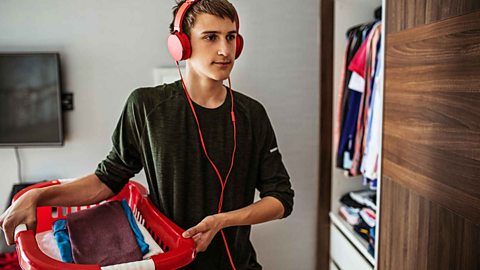This article was first published in May 2021.
If you’re feeling under pressure, you’re not alone. Along with all the usual demands of life, the last year has brought some new challenges. However, there are some things you can do to ease the pressure if you’re feeling stressed. We asked Dr Dominique Thompson, GP and young people’s mental health expert, for her top tips on dealing with some of the things that might be affecting your wellbeing right now.

Perfectionism
Over the last few years researchers have discovered that young people are becoming increasingly perfectionist in their behaviours. This means that some young adults are not happy with ‘good enough’ – they want everything to be perfect all the time. You may be experiencing this if you feel very unhappy or self-critical if you score 95% in a test, for example, and spend a lot of time worrying about the other 5%.
It’s not just academic achievements that young people get stressed about: it could also be your appearance, sport and even your cake baking that you feel has to be the ‘best’. If you recognise this tendency to self-criticise for not reaching impossibly high targets, then maybe it’s time to take a moment to reflect on how this might be making you feel (anxious, stressed, sad, like a ‘failure’?) and take a breath.
Try this:
- Stop setting yourself unrealistic targets
- Decide that sometimes it’s ok to be ‘good enough’
- Be happy to do your best, and understand that you don’t have to be THE best.


Competitiveness
Why are today’s young people much more perfectionistic than their parents? It’s a good question! The theory is this: society has become much more competitive in the last couple of decades. Everything from going to university (1 in 2 people now go, compared with 1 in 5 in the Eighties), to cooking, pottery – even falling in love and dating – have become openly competitive.
Living in such a competitive world is bound to have an effect on you. Perhaps, without even realising it, you start to view everything as a competition. What you wear, your body shape, your relationships, your cupcakes and, of course, your exam results can all feel up for judgment or criticism. No wonder you’re aiming for perfection, even though it’s not good for your wellbeing.
It’s time for you to ‘take back control’ if you want to break the competitive/ perfectionist cycle.
Try this:
- Pace yourself – and give yourself a pat on the back when you do well
- Say ‘no’ to unnecessary competition – fancy dress can be just that, wonky cakes taste as good as winning cakes… And you can date whoever you like!
- There’s no need to be #winning all the time – learning from ‘failure’ is good too.


Social media
Your online feeds are a great way to connect with other people, make like-minded friends and be informed about what’s happening. It’s important to be aware, though, how social media can act as a magnifying lens for the perfectionism and competitiveness we have mentioned, which may be harmful to your mental health.
Social media amplifies the comparisons that can make you unhappy with yourself and push you to be someone different. Being aware of how social media distorts your achievements or your image (by making them feel less than they are) is vital if you’re going to use it in a healthy way.
Be the best version of yourself that you want to be, by living the life that makes you content.
Try this:
- Block (mute) any negativity and be kind
- Create your ‘brand’ (image and values) with what matters to you – don’t be afraid to be your #unfiltered self
- Be proud of what and who you are in real life.


Loneliness and isolation
Lots of people feel lonely at different times in life, but young people can be particularly susceptible to feeling isolated (not just because of the pandemic) or like you don’t belong.
If you’re a teenager, know that it’s common for people your age to struggle as you discover your independence from your family and seek out your ‘tribe’.
Young people are also very sensitive to how other people make them feel, so it can be an emotional time: moving schools, setting off for university or a new job, trying new activities and finding friends who make you feel good about yourself.
If you haven’t yet found the right people to spend time with, don’t worry. It can take time.You will constantly meet new people throughout life.
Try this:
- Try new activities, through sports, art, music or whatever you might like, and don’t be afraid to join in a few times till you become a familiar face in the group. It gets easier as you get older
- Volunteer for, and take part in, community projects through school or college to meet like-minded people whilst doing something positive.


Independence
Every generation has had to become independent, of course – leaving home for college, university, or the workplace, for example – but developing the life skills necessary for successful independent living can be hard work. It may even be that your parents or carers have been so keen to protect you from stress or were distracted elsewhere so that you haven’t yet had a chance to learn how to cook or do laundry, how to make a GP appointment, or use public transport.
Depending on your age, it's important to be able to do these things so that you can look after yourself and focus on other (more exciting!) things as you get older.
You may need to encourage your parents to help you to learn these life skills. It’s natural that they might want to do them for you so you can focus on work, but ‘adulting’ is much easier if you can look after some of your own needs yourself. It will make you feel confident, show your family what you can do, and be a brilliant step towards whatever you do next in life.
Try this:
- Offer to make lunch or dinner occasionally
- Learn how to do other things around the house – e.g. wash your own clothes and bedsheets
- Discuss with your parents other ways in which you can move towards more independence, both at home and out in the world.

And finally...
There are a lot of things that can make you feel stressed, but the fantastic news is that there's a lot you can do to make yourself feel more confident, in control, and ready for life as a young adult in the 21st century.
It’s your life, live it the way you want to! And remember, whatever the issue, you are not alone. Talking to someone you trust is always a good first step.

If you need support
You should always tell someone about the things you’re worried about. You can tell a friend, parent, guardian, teacher, or another trusted adult. If you're struggling with your mental health, going to your GP can be a good place to start to find help. Your GP can let you know what support is available to you, suggest different types of treatment and offer regular check-ups to see how you’re doing.
If you’re in need of in-the-moment support you can contact Childline, where you can speak to a counsellor. Their lines are open 24 hours a day, 7 days a week.
There are more links to helpful organisations on BBC Action Line.

How happy hormones can help fight stress
Natasha Devon on how to create the happy hormones that help fight stress.

The irony and the illusion of perfectionism
Natasha Devon on how perfectionism can be counter-productive.

Mental health and wellbeing
Stories, tips and advice on how to boost your mental health and wellbeing.
